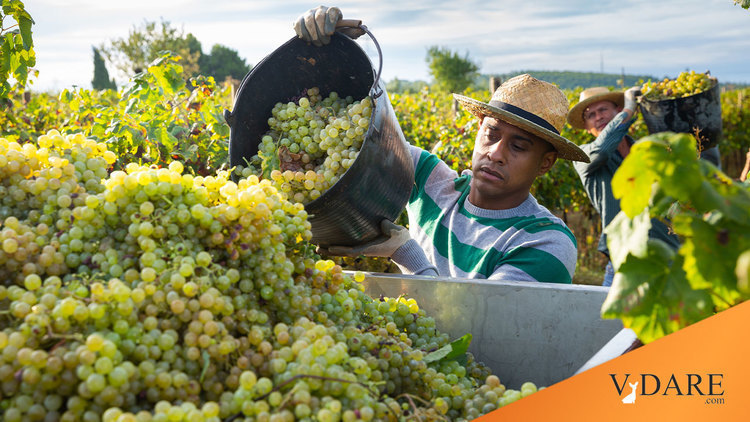
News Flash: Crops Not Rotting In The Fields Because Growers Are Raising Wages
By Steve Sailer
05/12/2013
The Fresno Bee reports an epochal breakthrough in economic theory is taking place in the fields of the Central Valley of California. As everybody who took Econ 101 in college knows, the Law of Supply and Demand says that shortages and surpluses push wages toward market-clearing prices. Except that, as we all know from reading hundreds of newspaper stories rewritten from press releases issued by growers' PR guys, the Law of Supply and Demand doesn’t apply in the case of farm labor. There, the only alternative to Crops Rotting in the Fields is for the government to let growers import more foreign peasants. (Also, it would help if the government would round up the workers for the growers when they try to run away — see the Dred Scot decision of 1857 for some common sense on the necessity of a Fugitive Slave Worker Act.)
But, now, in what sounds like a Nobel-worthy innovation, it turns out the Law of Supply and Demand is actually working in the Central Valley the same way it works everywhere else:
Valley farm-labor shortage boosts wages for workersBy Robert Rodriguez — The Fresno Bee
Friday, May. 10, 2013 | 11:48 PM
Fears of a potential farm labor shortage have caused San Joaquin Valley growers to boost wages to as much as $10 an hour this year to attract and keep workers for the harvest season.
With the farm-labor pool already tight and crops ready to be picked, growers are scrambling to secure their supply of workers.
"It is getting very competitive out there and employers are having to offer incentives to find the labor they need," said Oscar Ramos, a grape farmer and Kingsburg-based farm-labor contractor. "And one of those incentives is higher wages."
Farmers and agriculture industry leaders say wages have risen $1 to a $1.50 an hour this year compared to last year, or as much as 12%. Among Valley farmers, hourly wages are hovering between $9 and $10 an hour, which is higher than California’s minimum wage of $8.
Wages could go even higher. In September 2012, the average hourly earnings for San Joaquin Valley farmworkers rose to $12.09 during the peak of the harvest season.
For workers like Jose Aceves, the higher wage is a welcome relief. Aceves and a crew of about 20 workers harvested peaches for HMC Farms in the Selma area Friday morning.
"We really appreciate being paid more," Aceves said.
I’m starting to wonder if this isn’t an Onion article, except I know the Onion would never touch this subject.
"Because we know how hard it is right now for some farms to find enough workers. There just aren’t as many people as there used to be."Experts say tighter border security, increased smuggling costs for immigrants and drug-related violence are contributing to fewer people coming to the United States from Mexico — a longtime source of undocumented workers for Valley farmers.
Adding a new wrinkle to the shortage of workers is the fear of immigration sweeps. On Friday, agriculture officials, farmers and law enforcement came together to quell rumors that Immigration and Customs Enforcement officials were rounding up people.
Manuel Cunha, president of the Fresno-based Nisei Farmers League, said he spoke to federal officials, who assured him that no raids are taking place. Cunha said the rumors couldn’t have come at a worse time.
"We already have a labor shortage and this only exacerbates the problem," Cunha said. "People are staying home because they are afraid."
Wait a minute … I keep reading about how the Obama Administration is deporting vast numbers of illegal aliens, but here it says they aren’t doing any work place enforcement in the world’s most famous site of employment of illegal immigrants. (If I wasn’t a nice person, I might assume that the Obama Administration merely changed how they count deportations to reassure voters opposed to illegal immigration.) And I thought nobody was immigrating ever again from Mexico.
Farmers knew the shortage was going to get worse before it got better. After dealing with fewer workers last year, they were spurred to take quick action this season."What we are seeing is the concern farmers have that they may not get the workers they need, or that they lose them to someone else," said Barry Bedwell, president of the Fresno-based California Grape and Tree Fruit League. "And it is already happening."
Bedwell said he heard from a grape grower who lost workers to another farmer who was paying higher wages.
Fortunately, this ground-breaking experiment in economic theory won’t have to proceed much further because the Gang of Eight’s immigration bill is raising the number of farm labor guest workers. And we all know that America is greatly benefited by Mexican guest workers coming here and having lots of children. Only unscientific social scientists like Jason Richwine or Christopher Jencks would have any concerns about the intellectual acuity and economic productivity of descendants of stoop laborers.
